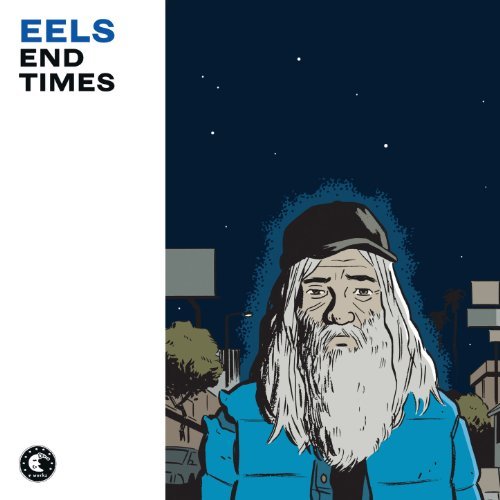
Eels
End Times
Release Date: Jan 19, 2010
Genre(s): Rock, Alternative
Record label: Vagrant
Music Critic Score
How the Music Critic Score works
Buy End Times from Amazon
Album Review: End Times by Eels
Very Good, Based on 10 Critics
Based on rating 8/10
Misery, disparity and a broken heart often leads to the most regarded work in an artist’s career. Mark Oliver Everett (E) is no different, but perhaps enough is enough? I, like a lot of people truly relish in the auditory pleasure of hearing somebody rip out their heart and soul and put it to record - there is a perplexing comfort in sharing or relating to others anguish. When it is done well, it can have as devastating effects on the listener as the original ones had on the artist that forced them to make the record in the first place.
Based on rating 8/10
Mark “E” Everett’s Eels have been prolific these last five years, issuing new, live, and retrospective recordings; even a film score. Since 2005’s Blinking Lights and Other Revelations, Everett has written songs increasingly obsessed with his own loneliness and aging. Adrian Tomine's cover illustration for End Times depicts a raggedy old man reinforcing these themes before the album even starts.
Based on rating 8.0/10
Mark Everett is the closest thing Generation X had to a Neil Young: a versatile, prolific and consistent songwriter too often overshadowed by his peers (in this case, Radiohead, Built to Spill, and the Flaming Lips) because of the lack of a true classic album. Despite the fact that 2009's Hombre Lobo was one of the best, most complete Eels records to date, the band suffered from not releasing its OK Computer/Soft Bulletin equivalent at a time when critics still cared about continuing Kurt Cobain's legacy. Perhaps that apathy was produced by a rare extended stretch without a new Eels album.
Based on rating 8/10
“Well, it’s a pretty bad place outside this door / I could go out there but I don’t see what for.” Eels' eighth set is Mark Oliver Everett’s self-described ‘divorce album’, painting him as a Gatsby-esque figure, rattling around his Los Angeles home alone. “It’s just me, myself, and the secrets that live within the walls / of the Mansions of Los Feliz”. Written and primarily self-recorded in his own basement, this record tells a true story as laden with a deep sadness as anything Fitzgerald’s fiction ever imagined.
Based on rating 4/5
Mark Everett and Eels' second album in six months isn't quite a work of staggering genius, but it's heartbreaking all the same. The title and artwork (a graphic of an old-aged E) hint at what's inside. End Times seems to refer to two concepts at work: first, E figuratively contemplating the end of his life as an old man. Second, and not quite as subtly, it's about the end of a relationship.
Based on rating 7/10
After last year’s Hombre Lobo brought to an end the longest break between records in the Eel’s relatively long history (their full debut came in 1996), Mark Oliver Everett, more widely known as E, seems to be making up for lost time with the blink and you miss it gap of only six months before this, the latest Eels record End Times. End Times was largely self recorded on an old four-track in E’s Los Angeles basement and is an album dealing with lost love. This loneliness rings out across much of the record with lyrics like “its just me, myself and the secrets of the walls”.
Based on rating 3/5
With the end of the world looming just two short years away in 2012, it seems fitting that Eels’ Mark Everett would offer his prescient insight into the collective apocalyptic consciousness on his latest opus, End Times. Only six months removed from Hombre Lobo, his lycanthrope-themed exploration of the nature of human desire, it can be argued that his latest is as natural a progression as any of Everett’s work. After all, his choice in album topics has always alternated between the absurd and the melancholy.
Based on rating 3.9/10
If sad bastard music is looking to nominate a new key-holder, consider End Times as Mark Oliver Everett's formal bid. Over the course of eight studio albums as Eels, Everett has made a career of feeling sorry for himself in some capacity-- typically, these misanthropic leanings have been juxtaposed against childlike flits of whimsy or coffee-black observations of varying degrees of wit. He was, for the most part, never humorless; he was gratingly self-referential and bogged-down by the Leonard Cohen-as-Eeyore thing he does.
Opinion: Excellent
As startlingly direct and melodically assured as ever. James Skinner 2010 Utters Mark Oliver Everett as Eels’ latest gets underway: “Everything was beautiful and free / In the beginning.” Over a threadbare backing track, he uses a few broad strokes to paint a picture of domestic bliss, his words at once tender, candid, and – this is an Eels record, after all – loaded with foreboding. What do you do when there’s nothing to do? If you’re with the one you love, Everett suggests, do whatever.
Opinion: Very Good
EELS“End Times”(E Works/Vagrant) Mark Oliver Everett, the songwriter behind Eels, regularly casts himself as a man who’s solitary, miserable and getting worse, quietly or noisily. It’s a role that suits his bleary voice and his direct, unadorned lyrics. Mr. Everett stays mostly subdued on ….
'End Times'
is available now

